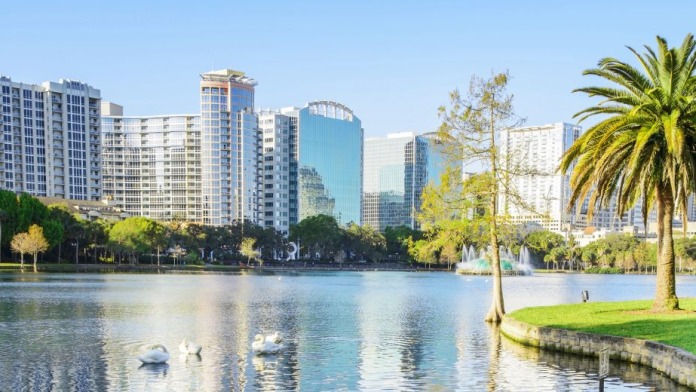Florida’s Coordinated Opioid Recovery (CORE) Program
Good news: Florida’s innovative Coordinated Opioid Recovery (CORE) program is expanding, adding five new counties to its network. CORE is designed to help addicted individuals achieve not just abstinence, but stabilization in all areas of their lives. It addresses mental health, physical health, and social and economic needs such as housing and career training, in addition to substance use. I hope this holistic, whole-life approach continues to expand in Florida and catches on elsewhere. Addressing the reasons why people turn to substances to cope with life problems should result in more substantial and sustainable healing.
~ Rita Milios
How Much Does Florida Drug Rehab Cost?
Florida is ranked 21st nationwide in terms of addiction treatment affordability, with an average cost of addiction treatment of $56,640.
- Medical detox is the most expensive, with an average cost of $139,638
- Inpatient rehab in Florida costs an average of $49,981
- Outpatient rehab in Florida costs and average of $8,305
- Outpatient methadone treatment is the most affordable, with an average cost of $7,379
Cost of Addiction Treatment in Florida Compared to Nearby States
Here’s how much drug rehab programs cost in Florida vs nearby states like Georgia, Alabama, and South Carolina.
The numbers above are the average costs of all treatment types without any insurance coverage. This includes medically supervised detox and lengthy inpatient rehab programs, which drives up the average cost. The average individual can expect to pay much less, and exact costs of drug and alcohol rehab in Florida will depend on several factors, including:
Treatment setting (inpatient or outpatient)
Features and amenities (luxury or standard rehab facility)
Duration of program (30, 60, or 90 days)
Health insurance plan
Choosing a rehab facility in-network with health insurance provider
Government funding
Location (city vs. suburb)
How to Pay for Drug Rehab in Florida
As of 2024, there were over 790 drug rehab facilities across the state of Florida. These facilities accept several payment methods. Of those treatment facilities, the following numbers reflect how many accept their respective payment methods:
There are a number of low and no cost payment options available for clients in Florida. Below are some of the methods that you can use to pay for addiction treatment.
Medicare
Medicare is a federal health insurance program for people who are over 65 or who are disabled. It covers addiction treatment at every level, including residential. You may have traditional Medicare administered directly by the government, or you may have a Medicare Advantage plan. Medicare Advantage plans are administered by commercial insurers and often have a provider network they will expect you to use.
Medicaid
Florida Medicaid covers addiction treatment at every level, including residential. To be eligible for Medicaid in Florida, your income must be below a certain amount. That amount varies depending on how many people you have in your family. The Florida Department of Children and Families is where you should go to apply.. Other health insurance programs in Florida for people with low income include FloridaKidCare and the Medically Needy program. The Medically Needy program is for people struggling to afford health insurance but making too much to be eligible for Medicaid.
Tribal Funding
The Seminole tribe has an outpatient clinic in Hollywood that is free if you’re a tribal citizen. This clinic offers outpatient substance abuse treatment. Additionally, if you’re a member of a federally recognized tribe you can get Medicaid without any premiums if your income is as high as 300% of poverty level.
Military Benefits
If you have VA Healthcare, you can get addiction treatment at VA hospitals and clinics. The VA health system offers a full range of services for addiction treatment, including residential treatment options. People with CHAMPVA benefits may be able to get addiction services at their local VA, but you will need to check if that VA accepts CHAMPVA. People with CHAMPVA can also sometimes use services that take Tricare, but you need to check with the service to make sure they also take CHAMPVA. If you have Tricare for military health benefits, you can go anywhere within the Tricare network.
Insurance and Private Pay
Many people pay for drug and alcohol treatment with their health insurance or by just paying cash. Some people take out a loan to pay for treatment.
If you choose to use health insurance, you will want to consider how much your deductible is. You’ll also need to know which addiction treatment providers are within your network so you can make sure that those are the ones you use. If you want or need to go out of network for addiction treatment, check your out of network deductible and total out of pocket costs before you decide to do so. Doing this will help prevent surprise expenses.
The following is a list of major health insurance companies in Florida:
- GuideWell – Florida Blue
- Capital Health Plan
- Florida Health Care Plan
- Cigna
- Humana
- Aetna
- UnitedHealth
Other Low Cost Options
Many addiction treatment centers have income based sliding scales to help put addiction treatment within reach for people in every income bracket. Outpatient primary care clinics that receive certain types of federal funding are required to have addiction services as part of their service offerings and cannot turn anyone away due to their inability to pay. Many counties in Florida have resources available for county residents, making county government web pages a good place to check.
Free Treatment Programs
If you’re experiencing addiction, the cost of care can be a significant barrier. But it doesn’t have to be this way. If you don’t have insurance, some religious organizations provide free treatment. Drug treatment resources in Florida are often offered at the county level. Some county level resources receive state funding in the form of grant money, so you may want to consider asking about resources for people who can’t afford treatment.
Some organizations give scholarships for substance use treatment. Sometimes, the agency where you get treatment can provide you with a scholarship, but some scholarship funds work with multiple rehabs. If you’re looking for low cost or free rehabs in Florida, they guide below can help you find the care that’s best for you.
Free Addiction Resources in Florida
A range of low and no cost treatment facilities can be found throughout the state of Florida. Many offer specialized programs for at risk and underserved client populations.
Sonrise Mission Center
The Sonrise Mission Center is a Christian residence for adults who have addictions and who wish to stop using drugs and alcohol. They help people stop using drugs by teaching them to adopt a Christian lifestyle. The program lasts approximately eight to sixteen months and is entirely free. Funding comes from charitable donations from the community.
Jefferson Reaves Women’s Residential Substance Use Treatment Program
The Jefferson Reaves Women’s Residential Substance Use Treatment Program gets federal funding to help them operate. In return, they don’t turn anyone away who can’t pay. Their 40 bed residence allows women in recovery from alcohol and substance use disorder to have their children under the age of five with them while they get treatment.
Caron Addiction Treatment Centers
Caron has a few locations in Florida, including Boca Raton and Delray Beach. They have a treatment track for older adults and another for people with co-occuring mental health needs. You must apply for a scholarship to receive free treatment. You can ask about this option when you call.
Salvation Army Adult Rehabilitation Centers (ARC)
The Salvation Army ARCs offer free residential drug and alcohol rehab. In Florida, you can find them in St. Petersburg, Tampa, and Fort Lauderdale. If you decide to participate in their program, you can expect to be there 180 days. Their program activities include working in their consignment store, getting counseling and participating in Christian worship.
Hanley Center
The Hanley Center is an alcohol and drug treatment center in West Palm Beach that is an extension of the Hanley Foundation. The Hanley Foundation is a charitable organization that offers scholarships to people seeking substance abuse treatment. They accept insurance and private pay but you can ask to apply for a Hanley Foundation Lifesaver scholarship to cover your fees. These scholarships cover expenses throughout the continuum of addiction care.
Florida Drug and Alcohol Use Statistics
Statistics related to Florida drug and alcohol rehab admissions include:3

White (non-Hispanic) admissions made up the largest demographic at 68%.

Black or African American admissions were the next highest demographic at 22%.

Approximately 23% of admissions were youths between the ages of 12 and 19.

Male admissions exceeded female admissions by more than 20%.
Florida Drug Laws
The Florida Marchman Act
This law allows for people who need substance use treatment to be forced into treatment against their will. Anyone who knows the person who is using drugs can petition for that person to get involuntary treatment. The person would have to be at risk of harming themselves or someone else due to substance use, or they need to be in denial of their need for treatment.
Employment Drug Testing
Florida law does allow employers to conduct drug testing on potential and current employees if they are part of Florida’s Drug Free Workplace program. If so, they must give notice that they require drug testing in the job advertisement. If an employer plans to start drug testing, they must give employees 60 days notice before the first drug test and then post the policy for drug testing.
First Responder Exposure to Fentanyl
In 2024, Florida enacted a law to increase the penalty for exposing first responders to fentanyl. The law states that if you expose a first responder to fentanyl, you can be charged with a second degree felony. The law does include protection for you if you called first responders because you honestly thought that you or someone else overdosed.
Cannabis Law in Florida
Medical marijuana became legal in Florida in 2016. To be allowed to have it you need a license, and your name has to be on the medical marijuana registry. However, even if you have a medical marijuana license, you can’t grow it. Cannabis possession by people without a medical marijuana license is illegal. If you have less than 20 grams it’s a first degree misdemeanor. The penalty is up to $1,000 and a year in jail. There is a ballot initiative to legalize recreational marijuana that Florida voters will vote on in November 2024.
Resources
- Substance Abuse and Mental Health Services Administration, Center for Behavioral Health Statistics and Quality. (2022). Findtreatment.gov.
- Statista. (2020). Number of substance abuse treatment clients in the U.S. as of 2020, by state.
- Substance Abuse and Mental Health Services Administration, Center for Behavioral Health Statistics and Quality. (2019). Treatment Episode Data Set (TEDS) 2019 (Revised): Admissions to and Discharges From Publicly Funded Substance Use Treatment.
- Centers for Disease Control and Prevention. (2019). What is excessive alcohol use?
- United Health Foundation. (2022). America’s Health Rankings Annual Report: Excessive Drinking in Florida.
- World Health Organization. (2018.) Global status report on alcohol and health 2018.
- U.S. Department of Health and Human Services, Office of the Surgeon General. (2016). Facing Addiction in America: The Surgeon General’s Report on Alcohol, Drugs, and Health.
- United Health Foundation. (2022). America’s Health Rankings Annual Report.
- Centers for Disease Control and Prevention. (2022). Drug Overdose Deaths.
- National Institute on Drug Abuse. (2018). Principles of Drug Addiction Treatment: A Research-Based Guide (Third Edition), Principles of Effective Treatment.
- National Institute on Drug Abuse. (2018). Principles of Drug Addiction Treatment: A Research-Based Guide (Third Edition), Cognitive-Behavioral Therapy (Alcohol, Marijuana, Cocaine, Methamphetamine, Nicotine).
- Häuser, W., Hagl, M., Schmierer, A., & Hansen, E. (2016). The Efficacy, Safety and Applications of Medical Hypnosis. Deutsches Arzteblatt international, 113(17), 289–296.
- Fals-Stewart, W., O’Farrell, T. J., & Birchler, G. R. (2004). Behavioral couples therapy for substance abuse: rationale, methods, and findings. Science & practice perspectives, 2(2), 30–41.
- Substance Abuse and Mental Health Services Administration. (2005). Treatment Improvement Protocol (TIP) Series, No. 41. 1 Groups and Substance Abuse Treatment.
- Substance Abuse and Mental Health Services Administration. (2005). Treatment Improvement Protocol (TIP) Series, No. 41. 2 Types of Groups Commonly Used in Substance Abuse Treatment.
- Rahman A, Paul M. (2021). Delirium Tremens. In: StatPearls [Internet]. Treasure Island (FL): StatPearls Publishing.
- Florida Administrative Code & Florida Administrative Register. (2019). Common Licensing Standards.
- National Institute on Drug Abuse. (2018). Principles of Drug Addiction Treatment: A Research-Based Guide (Third Edition), Alcohol Addiction.
- Substance Abuse and Mental Health Services Administration, Center for Behavioral Health Statistics and Quality. (2020). National Survey of Substance Abuse Treatment Services (N-SSATS): 2020 Data on Substance Abuse Treatment Facilities.
- Substance Abuse and Mental Health Services Administration, Center for Behavioral Health Statistics and Quality. (2021). Telehealth for the Treatment of Serious Mental Illness and Substance Use Disorders.
- Telehealth.hhs.gov. Tele-treatment for substance use disorders.
- Florida Department of Environmental Protection. (2022). Florida Coastal Access Guide.
- State of Florida Department of Children and Families Substance Abuse Program. (2003). Marchman Act User Reference Guide 2003.
- National Institutes of Health National Institute on Drug Abuse. (2022). Drug use severity in adolescence affects substance use disorder risk in adulthood
- Substance Abuse and Mental Health Services Administration. (2023). Medications for Substance Use Disorders.
- Florida DCF Substance Use Treatment: https://www.myflfamilies.com/services/samh/treatment
- Miami Dade: https://www.miamidade.gov/global/service.page?Mduid_service=ser1542234441253341
- Florida Marchman Act: https://www.myflfamilies.com/crisis-services/marchman-act
- Florida core network: https://www.flcorenetwork.com/
- Fentanyl First Responders Law New Brief: https://www.flcorenetwork.com/news/governor-ron-desantis-signs-legislation-to-protect-law-enforcement-officers-from-fentanyl-exposure-expands-core-network-in-florida/
- Fentanyl First Responders Law Press release: https://www.flgov.com/2024/04/08/governor-ron-desantis-signs-legislation-to-protect-law-enforcement-officers-from-fentanyl-exposure-expands-core-network-in-florida/
- Florida Drug Testing Law: https://www.flsenate.gov/laws/statutes/2018/440.102
- Seacrest Recovery Center: https://seacrestrecoverycenter.com/scholarship/
- Hanley Foundation Scholarship: https://hanleyfoundation.org/treatment/lifesaver-scholarship/
- Caron: https://www.caron.org/donate/scholarship-funds
- Florida Medicaid: https://www.myflfamilies.com/medicaid
- Florida Health Insurance Plans: https://healthinsuranceratings.ncqa.org/2019/search/Commercial/FL
- Tribal Eligibility for Health Benefits: https://www.healthcare.gov/american-indians-alaska-natives/medicaid-chip/
- CHAMPVA: https://www.va.gov/COMMUNITYCARE/programs/dependents/champva/index.asp
- Accreditation options & certification for behavioral health accreditation. (2024). Retrieved from https://www.jointcommission.org/what-we-offer/accreditation/health-care-settings/behavioral-health-care/learn/accreditation-options-certifications/
- American Society of Addiction Medicine. (2022). The ASAM criteria assessment interview guide. https://www.asam.org/asam-criteria
- Find a CCBHC (2024). National Council for Mental Wellbeing. Retrieved from https://www.thenationalcouncil.org/program/ccbhc-success-center/ccbhc-locator/
- Florida SUD Licensure. (2024). Retrieved from https://www.myflfamilies.com/services/licensing/samh#forms
- Home Commission on the Accreditation of Rehabilitation Facilities. (2024). CARF International. Retrieved from https://carf.org/
- Oxford House. (2024). Retrieved from https://oxfordhouse.org/questions_and_answers
- Partners: CORE Model – CORE Network. (2022, November 16). https://www.flcorenetwork.com/core_model/
- Sober Living | Oxford House Florida | Recovery Housing | Addiction | Alcoholic |. (2024). Retrieved from https://www.oxfordhousefl.org/
- Treatment for Substance Abuse Florida DCF. (2024). Retrieved from https://www.myflfamilies.com/services/samh/treatment









